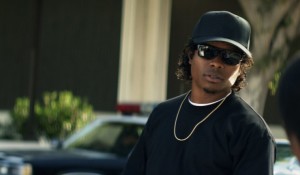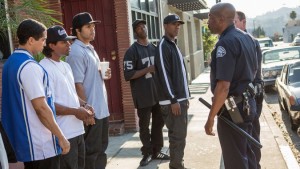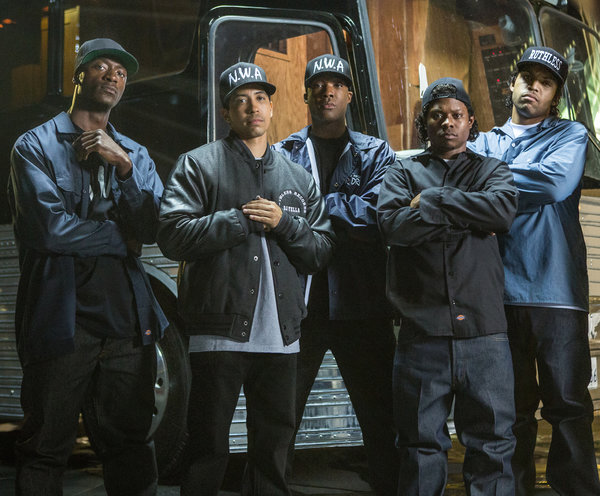Biopics are an odd genre. They face many problems, including, but not limited to: is the subject’s life interesting enough to be put on film? Generally, if a person is having a biopic made about them, their lives were at least a little eventful. It’s down to the writers, directors, and most importantly, actors, to immortalise a life on the big screen. It can be a daunting task, and it can fail, horribly, as in John Wayne playing an Asian conqueror.
Like the aforementioned “The Conqueror” and other ill-fated biopics (like “W.” and “J. Edger”), the biopic can go from mediocre to downright terrible. There are of course excellant biopics as well, “Hunger” and “Raging Bull” being favourites of mine. They all share one similarity: the vast majority are about historical figures, politicians, etc. Director F. Gary Gray throws that idea out the window with “Straight Outta Compton,” a biopic about the incredibly influential rap group N.W. A. The film is the most surprising hit in a summer filled with supperheros and big name movies, a film exploring the world of rap culture as well as other topics.
The plot is pretty easy to explain: the film chronicles the rise, success, and subsequent splitting up ofN.W. A., while documenting all the bumps in the road that fame puts in front of them. While it does include the whole group, the film revolves around four characters: Eazy-E (James Mitchell), Dr. Dre (Corey Hawkins), Ice Cube (O’Shea Jackson Jr., the son of the actual Ice Cube), and the band’s manager, Jerry Heller (Paul Giamatti). They start out in their bedrooms in Compton, do the club circuit, Jerry notices them and the band gets signed to a record deal. They tour, they get more popular, and their collective egos start to inflate and cause a rift in the once tight knit group. Eazy tries to continue the group without Dre and Ice Cube…they went on to persue solo careers in music and screenwriting, respectively. They eventually try a reunion tour but personal tragedy puts a halt to those plans.

The film clocks in at nerly two and a half hours and frankly, the time flew while I was watching it. I’m not terribly interested in rap or music in general, but that’s the beauty of a good biopic: it can make the subject interesting to every single person watching it. This is partly due to the fact that it ingeniously uses the racial tension in the U.S. at the time as a plot device. It even goes as far as to use real life events like the Rodney King riots.
If nothing else, “Straight Outta Compton” highlights the troubles that black Americans went through from law enforcement, the general public, and even in their own communities. This sparks one of the most powerful scenes in the film, where the group are outside the recording studio in a “nice” neighbourhood for a break, and are stopped and searched by the police because they’re black in a predominantly white area. Their producer Jerry has to talk the officers out of arresting them and even raises his voice at the clear prejudice of the police. This leads to Ice Cube composing the infamous song, “F**k The Police.” Watching it, I could only describe it as peaceful aggression….a showcase of how freedom of speech doesn’t guarantee freedom of consequences. This launches the group into super stardom and solidifies them as the most polarizing figures in music at the time.
The bond between each member of the group becomes stronger each time they are threatened, given a dirty look, or subject to the casual racism that plagued the U.S. It shows they are more than a rap group: they’re friends. The film pounds this point home, which makes their fall all the more tragic. This is the terrible truth about the music industry shows itself. If you do not adapt, you do not survive. Dr. Dre and Ice Cube are still active to this day, the members of the N.W. A. Those who didn’t move on are just footnotes now. Eazy-E is hit the hardest with a fall from grace. The film follows how he was just wandering through life, clinging on to the one thing that connected him to the world. He eventually gets to a place where he’s forced to swallow his pride and contact both Ice Cube and Dr. Dre. It’s a humbling moment and finally puts an enigmatic character like Eazy-E and unveils him as Eric Wright. This again just makes the final act of the film all the more heart-wrenching.
 “Straight Outta Compton” acts as a character-driven film that highlights the injustices blacks faced in the States, and how the artistic freedom allowed to them (that wouldn’t have been a few years earlier), can help pull talented people out of a terrible life. I’d like to say that these injustices have stopped, but they haven’t. People like the N.W. A. gave a voice to the voiceless, and as such, proved that the American Dream was exactly that for most people, a dream. This is the American reality.
“Straight Outta Compton” acts as a character-driven film that highlights the injustices blacks faced in the States, and how the artistic freedom allowed to them (that wouldn’t have been a few years earlier), can help pull talented people out of a terrible life. I’d like to say that these injustices have stopped, but they haven’t. People like the N.W. A. gave a voice to the voiceless, and as such, proved that the American Dream was exactly that for most people, a dream. This is the American reality.
– by Paul O’Connor


